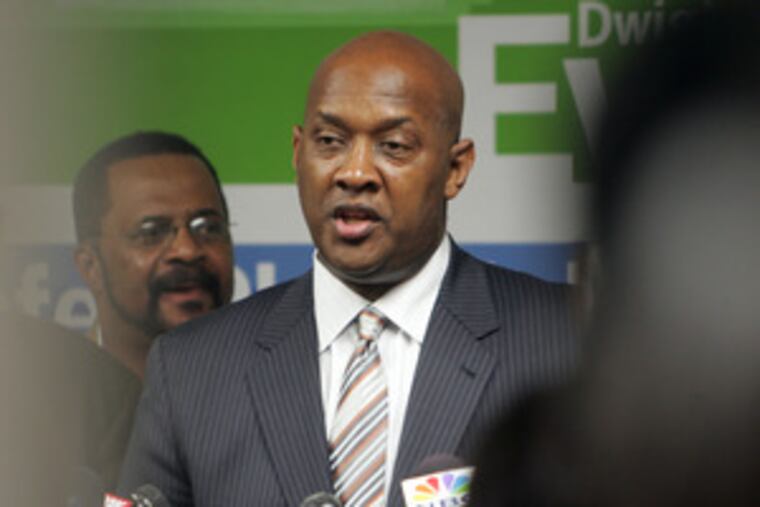A race glued to TV
The Knox factor: Ad domination mutes the usual buzz on the street.

As Philadelphia's mayoral Democratic primary campaign draws to a close, good luck finding campaign rallies: The candidates are busy chasing GRPs.
That's gross-ratings points, a measure of the reach of television ads.
As the battle flickers on TV screens, some city political hands say the campaign has entered a kind of silent spring on the streets: little buzz, fewer posters than usual, not as many sound trucks.
Polls suggest a large chunk of voters remain undecided with just 12 days left in the campaign.
"Holding kaffeeklatsches, getting up close with people, is kind of a lost art," said Martin Weinberg, a strategist for the late Mayor Frank L. Rizzo. Weinberg remembers going to as many as eight gatherings a night in voters' homes during the Rizzo campaigns, and to almost as many in his own 1999 effort.
But this year, a combination of campaign contribution limits and a self-financed millionaire candidate, Tom Knox, has created a strategic straitjacket for his four rival Democrats. Knox has dominated the airwaves, forcing the others to compete there as best they can.
"Tom Knox has changed the dynamic," said veteran campaign operative William Miller IV, who is supporting State Rep. Dwight Evans. "The money you raise has to go toward television commercials. There's nothing you do in the campaign that moves the [poll results] more than TV. I wish it weren't the case, but it is. And it's frustrating. What Knox has done has become the frame of reference."
There are other factors, strategists and outside analysts say: All five major Democrats in the May 15 primary are broadly seen as acceptable, and a profusion of joint appearances and TV debates chew up time that might be given over to more personal politicking.
In addition, Miller said, passion in the black community is down because three qualified black candidates are running. And, more broadly, there's no one to vote against this year, as there was in some campaigns.
Also, new city ordinances prevent candidates from putting signs on utility poles, he said.
Even Mayor Street, in an Inquirer interview published yesterday, said he was astounded at the "lack of excitement" in the campaign.
State Sen. Anthony H. Williams (D., Phila.) said he did not think there was less street activity in this campaign, but agreed that it was generating less buzz.
"When candidates don't attach to causes, you don't see the energy level you'd see otherwise," he said, referring in particular to the 1983 election, in which the city elected its first black mayor, and to 1999, when Street defeated Weinberg in the Democratic primary. "So you have high undecided, which could mean low turnout."
Any discussion of the campaign seems to go back to Knox's cash. He has spent more on the tube - an estimated $6 million since December - than his rivals put together.
That's about 16,000 GRPs, meaning a typical viewer in the Philadelphia TV market will have seen a Knox ad at least 160 times.
Former City Councilman Michael A. Nutter said he thought the relative difficulty in raising money in this campaign had forced the candidates other than Knox to work harder to meet people. "It forces you to use your time and your money as wisely as you can," Nutter said. "It is an incredible training ground for possibly becoming mayor, because the next mayor is not going to have a lot of time or a lot of money."
He still spends at least four hours a day on the telephone raising money - time that, in another year, might have been spent at public events.
The Nutter campaign tries to squeeze in two "visibility events" a day, if possible. Yesterday, for instance, he did a transit stop at Eighth and Market Streets in the morning, and was scheduled to walk through the commercial district around 45th Street and Baltimore Avenue in the evening.
"In 1999, we did a ton of direct mail, a lot of radio - everyone did - and we invested $1 million in Election Day efforts," said Ken Snyder, an adviser on Street's campaign eight years ago, when there were no campaign-contribution limits.
"You won't see anything approaching that this time, and you'll see lower turnout," said Snyder, media consultant for U.S. Rep. Bob Brady, another Democrat running for mayor. "The more you restrict finances in campaign, the more you restrict participation."
All the candidates, including the remaining Democrat, U.S. Rep. Chaka Fattah, are limited to $5,000 in contributions from an individual and $20,000 from a political committee. Knox may spend as much of his own cash as he wants because the U.S. Supreme Court has ruled that is a free-speech right.
Evans disputed any suggestion that voters have less exposure to the candidates this year, at least compared with the 1999 primary. "I think there's more public exposure this time around," he said, "far more forums, more debates. I think people are tuned in."
Evans did have an old-fashioned revival at the West Philadelphia YMCA Sunday, a sound truck parked in front on Chestnut Street blaring a loop of a campaign rap song. His campaign also passes out key chains - with the slogan "Safety is key: Dwight Evans for mayor" - a reference to the epidemic of gun-related homicides.
And last night, Evans was scheduled to reach out from inside his office with a tactic quieter than a rally and less kitschy than a key ring: a Webcast.
To read our profiles of all of the candidates, along with their campaign promises, our reporters' blog and more, go to http://go.philly.com/mayor
EndText